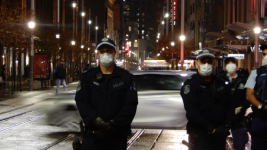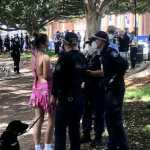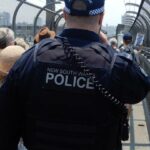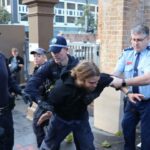Public Demands Accountability for Police Officers

The mid-1990s Royal Commission into the NSW Police Service uncovered evidence of entrenched corruption, which included state law enforcement officers selling heroin out the back of police stations, involved in running then illegal sex work services and trading in child pornography.
Also known as the Wood Royal Commission, the inquiry’s six volumes of findings served to clean up NSW police operations, with outcomes including the decriminalisation of sex work, drug law reform and the establishment of a state police oversight body.
But, according to Redfern Legal Centre senior police accountability solicitor Samantha Lee, it might be time for another investigation into the NSW Police Force. Yet, this time, the police conduct under the microscope would be alleged overreach in terms of the application of certain powers.
“It’s time to think about whether another Royal Commission is needed in NSW to look at how much the powers are going beyond the legislative framework and the cultural demise of the police force in NSW over the last few years,” Lee told Sydney Criminal Lawyers.
The solicitor further asserts that what’s been happening in this regard constitutes a “bleeding out” of police powers, specifically in terms of strip searches, drug dog use, the policing of the pandemic and the now defunct quota system.
Traumatising the public
These days, people living in NSW are faced with the prospect of being indicated by a drug dog on the street, in a pub or on entering an event, like a music festival. And if a pat down search doesn’t turn up anything, they can then be asked to strip naked in front of two armed and uniformed strangers.
The Wood inquiry didn’t scrutinise these practices, as, back in the 90s, they didn’t exist as they do in the present. Sniffer dogs didn’t become a part of everyday life in this state until 2001, while the heightened use of strip searches started to become apparent circa 2014.
The stated purpose of NSW police deploying drug dogs is to combat drug supply. But since the release of the 2006 Ombudsman report, it’s been widely understood that dogs falsely indicate two-thirds of the time, and if a search is successful, it usually turns up a small amount of cannabis.
The coupling of the dogs with strip searches has been steadily increasing since mid-last decade. In 2018, 11 percent of those indicated by a dog were subjected to this invasive practice. Yet, numerous reports outline that the effects of strip searches are similar to the impacts of sexual assault.
Lee went on to outline that strip searches were never meant to be used for minor drug possession, and, as the force itself admits, neither were sniffer dogs. But it’s not just this misapplication of strip searches and sniffer dogs that’s causing the controversy around NSW police.
Indeed, there have been countless complaints and official investigations into officers overstepping the mark to the point of illegality in applying strip searches. This not only includes breaching the legislated protocols, but police management advises that certain questionable procedures be used.
Silencing dissent
Another approach taken by NSW police that’s been scrutinised is that taken to public protest. Whilst bolstered by the increasing anti-protest laws being passed by the NSW Liberal Nationals, it was the mid-2020 surge in the Black Lives Matters movement that brought this issue to a head.
In the aftermath of the first lockdown, the NSW police commissioner attempted to have BLM rallies shut down by the NSW Supreme Court, presumably as they had a focus on police conduct. But when such actions did go ahead they were accompanied by saturation policing and excessive use of force.
This was followed by a crackdown on post-lockdown protest in general, which was facilitated by a clause in a public health order, and boiled over at Sydney University. Officers, again, employed excessive force to nonviolent student activists, and it only ended when officers turned on a professor.
Of late, NSW police has turned its attention to climate activists. One clear use of powers in a manner in which they were not intended to be used are the draconian bail conditions those participating in nonviolent direct climate actions are currently being served with.
While Strike Force Guard was established to target climate defenders last March. And some of its actions have led to charges of overreach in relation to its staking out protesters, visiting them at home, multiple raids, arresting individuals days after protests, and the storming of an activist picnic.
Fast food policing
Lee puts the stark rise in NSW police use of strip searches down in part to its quota system. Since at least 2018, police local area commands had been operating under a system of quotas in terms of the number of searches and move on order officers were required to carry out annually.
Then NSW Greens MLC, and now Senator David Shoebridge obtained the statistics relating to this system in late 2019, via freedom of information (FOI). And he stressed that the scheme clearly opened up “the use of both these police powers to serious abuse”.
And while NSW police announced that it has brought this controversial practice to an end early this year, the fact that officers had been pushed to increase their use of both searches and move on orders consistently over a long period is likely to see an ongoing spike in their application.
Shoebridge also exposed the fact that NSW police is paying out millions of dollars a year in compensation and settlements in relation to civil cases brought against it in regard to police misconduct and overreach in the field.
Information sought under FOI revealed that over 2019/20, 298 civil matters were brought against NSW police, with over $24 million paid out to cover them. And the Greens politician stressed that the evidence from the cases isn’t being used to improve or counter suspect practices.
Reducing the harms
Redfern Legal Centre currently has two cases before the Supreme Court. One is a class action challenging the legality of numerous strip searches carried out upon teenagers at festivals, whilst the other is a judicial review of a number of COVID fines handed out over the lockdown period.
The policing of the pandemic is another instance where the law enforcement institution presumably protecting the public from criminal behaviour was called out for its heavy-handed approach to enforcing the lockdown and the misapplication of fines in relation to this.
The onset of COVID policing saw the “usual suspects” being disproportionately targeted by the new powers granted. Those targeted consist of First Nations people, the young and the homeless, and this is further reflected in the decision to focus operations on less affluent neighbourhoods.
In terms of the use of dogs and strip searches on young people at events, numerous inquiries, including that of the NSW Coroner, have pointed out that these practices are encouraging festivalgoers to partake in dangerous drug-taking behaviours that sometimes result in death.
This difference between Wood and a fresh investigation is that the 1990s inquiry delved into officers partaking in underworld practices, whereas a current one would be examining how the state police service is now a paramilitary force countering dissent against the powerful and striking fear into the many.
“This is causing harm on the ground. And it really does impact most upon those who are most disadvantaged, while those who are already policed are just policed more,” Lee said in relation to the police actions involved in the two cases her community legal centre has before the courts.
“Whether this is coming from the top down or bottom up or in the middle, I’m not sure. But it really does need reeling in.”







